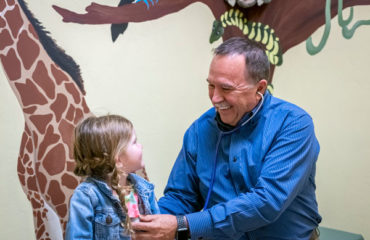
As the fall and winter season develops, many children will experience cough and wheezing episodes. Two questions that quickly arise are – Does my child have asthma and will he/she outgrow it?
About 50% of children less than 6 years will have at least one wheezing episode and about a third will develop persistent asthma. Asthma must be distinguished from many other conditions and treated appropriately. Asthma that is not well treated can place a heavy burden on a family, not only because of the child’s diminished health but the time and expense of office, emergency room, and hospital visits and missed school and work.
A good history of symptoms (recurrent cough and wheezing especially at night and early morning), a family history and exposure to environmental factors (smoke) are essential in making a diagnosis. A detailed physical examination with attention to the child’s growth and other body systems will help to rule out other causes. Laboratory and X-ray examinations may also be indicated. The child’s response to treatment will also help in establishing an asthma diagnosis.
Once the diagnosis is established, effective treatment for asthma is available to control and treat asthma flare ups. Of the children who continue to have persisting asthma, many will have fewer and fewer problems with wheezing over the first 10 – 12 years of life. However, some will continue to have persisting asthma into adulthood. Research is showing that there are certain risk factors that will increase the likelihood of asthma persisting. Medicine is not at a stage where we can definitely prevent it from persisting into adulthood but effective control can be realized with proper treatment. By building a three way partnership between the child, parent and pediatrician an effective asthma plan can be realized that will lead to an active healthy life.










You must be logged in to post a comment.